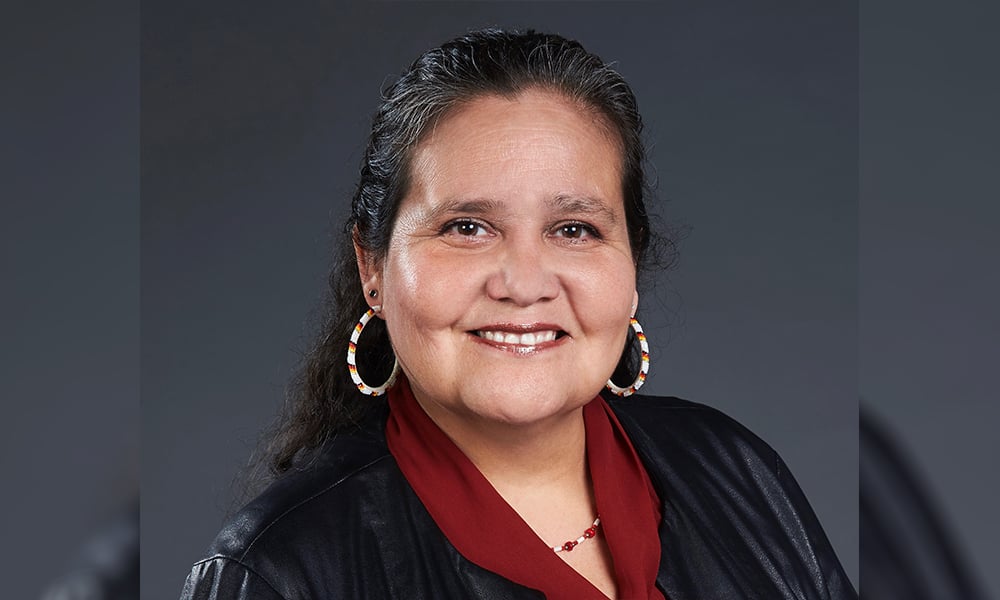
A flashpoint in Indigenous politics in the early ‘90s drove Beverly Jacobs towards a legal career

In her role as the next associate dean (academic) of the University of Windsor Faculty of Law, Dr. Beverly Jacobs plans on continuing to educate students and members of her own community on traditional Indigenous legal systems and the effect Canada’s own colonial laws have had on Indigenous people.
“Indigenous people were never given the opportunity to continue implementing or practicing Indigenous legal orders because of the genocidal policies that Canada enforced,” she says. “Now things are shifting. And in order for that to shift, there needs to be an understanding and awareness and education on all of those issues.”
Windsor announced Jacobs’ new role last month and she’s been teaching at the school since 2017. Her research has focused on Indigenous legal orders, Indigenous wholistic health, Indigenous research methodologies and decolonization of Eurocentric law. She was born and raised on the Six Nations of the Grand River Territory and is a member of the Mohawk Nation of the Haudenosaunee (Iroquois) Confederacy, Bear Clan.
Jacobs told Law Times that her path toward the legal profession began in the dawn of the nineties and was impelled by two seminal events. A young, single parent, Jacobs lost her own mother that year and soon after witnessed the Oka crisis. In 1990, the Quebec town of Oka became the sight of a months-long standoff between Mohawk protestors and the police and Canadian military, which arose over the expansion of a golf course and condominiums on land which included a Mohawk burial ground.
Jacobs began by working as a legal secretary and law clerk. Over six years she gained exposure to an array of different practice areas, before deciding to enter law school.
“I had decided… that if things were as monotonous as they were going to be, and I was doing all the lawyers’ work, anyway, I might as well be one,” Jacobs says.
“But it was Oka that sparked my advocacy and frustration.”
Jacobs took the pre-law course at the University of Saskatchewan, in Saskatoon, and then attended Windsor Law, graduating in 1994.
“By the time I finished law school, I decided that practicing law was wasn't for me. I was very frustrated in what I was learning; That law – Canadian Eurocentric law – was used as a tool to try to erase our people.”
Nevertheless, Jacobs “decided to abuse [herself] more,” and got an LLM, in which she focused on Haudenosaunee law, the Great Law of Peace and international law. She then returned home to Six Nations and opened a consulting business, in 1996. Her clients included Amnesty International and the Native Women’s Association of Canada. For Amnesty, she did research and consulting for their Stolen Sisters Report on missing and murdered Indigenous women and girls.
“That was the catalyst for me to work with families and advocate for the families of missing and murdered Indigenous women,” she says.
Her consulting work led Jacobs into politics. She was elected president of NWAC in 2004 and served until 2009. Her work for the organization dealt with the over-representation of Indigenous women in federal prisons, employment issues, health and violence against Indigenous women.
Jacobs work with NWAC led to the House of Commons in 2008, where she delivered the response to then Prime Minister Stephen Harper’s official apology to the victims of Canada’s residential school system.
After retiring from NWAC, Jacobs was recruited to do her PhD at the University of Calgary, where her studies focused on the impacts of resource development on the holistic health of the Mohawk people. In July 2017, after defending her dissertation, Jacobs began teaching at Windsor.
Returning to Windsor to teach Indigenous legal orders after having left more than 20 years before with the intention of advancing Haudenosaunee law, was “very, very powerful,” she says. And then, with plenty of work to be done on the administrative side of legal education to further institutional change, Jacobs says she decided to apply for the associate deanship.
“The Truth and Reconciliation Commission – I think their report was a spark to educational institutions, to law schools, to law societies. There were many calls to action for judges and lawyers and for systemic change, for an acknowledgement of the systemic racism that exists within the system,” she says.
“That's my goal; to implement those changes. To implement equality, because, basically, that's what we're all after.”
Jacobs was inducted as a member of the Order of Canada in 2018 and she has received the Franco-German Prize for Human Rights and the Rule of Law from the Governments of France and Germany for her human rights work advocating on behalf of missing and murdered Indigenous women and girls.